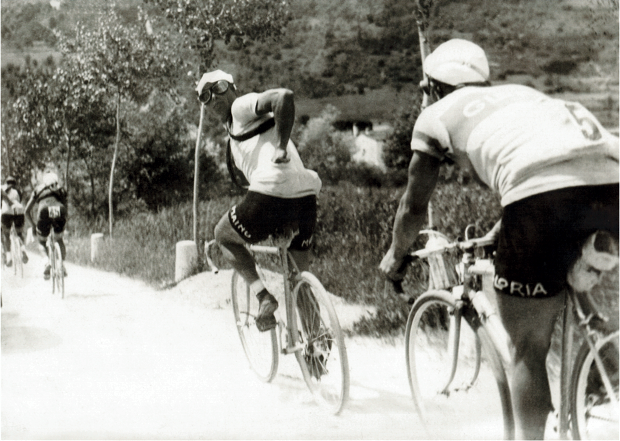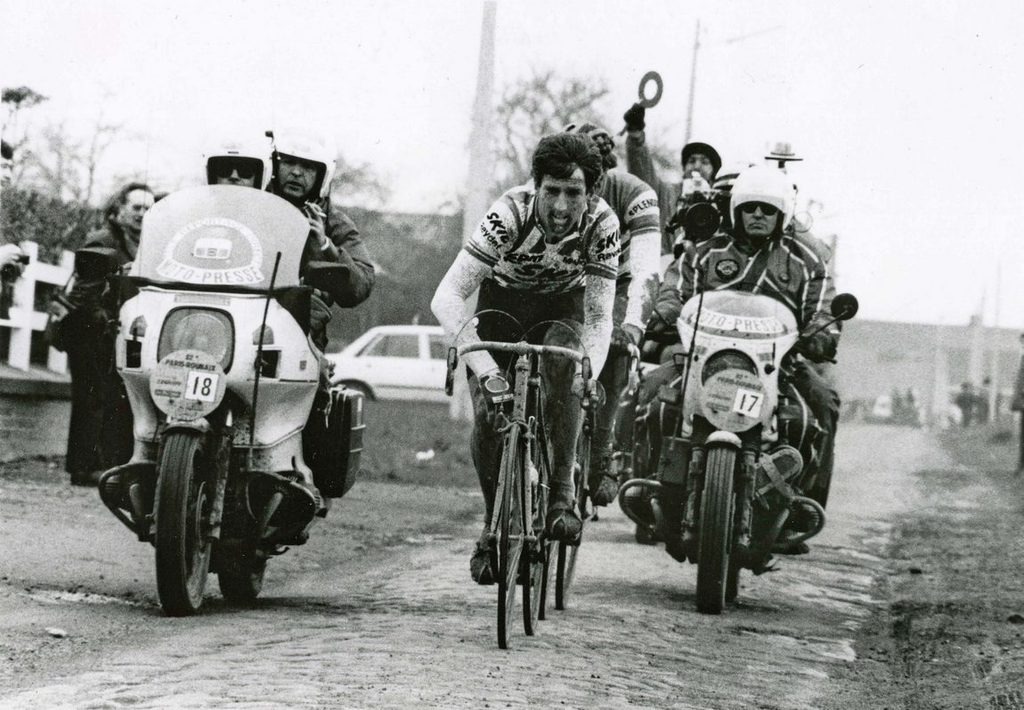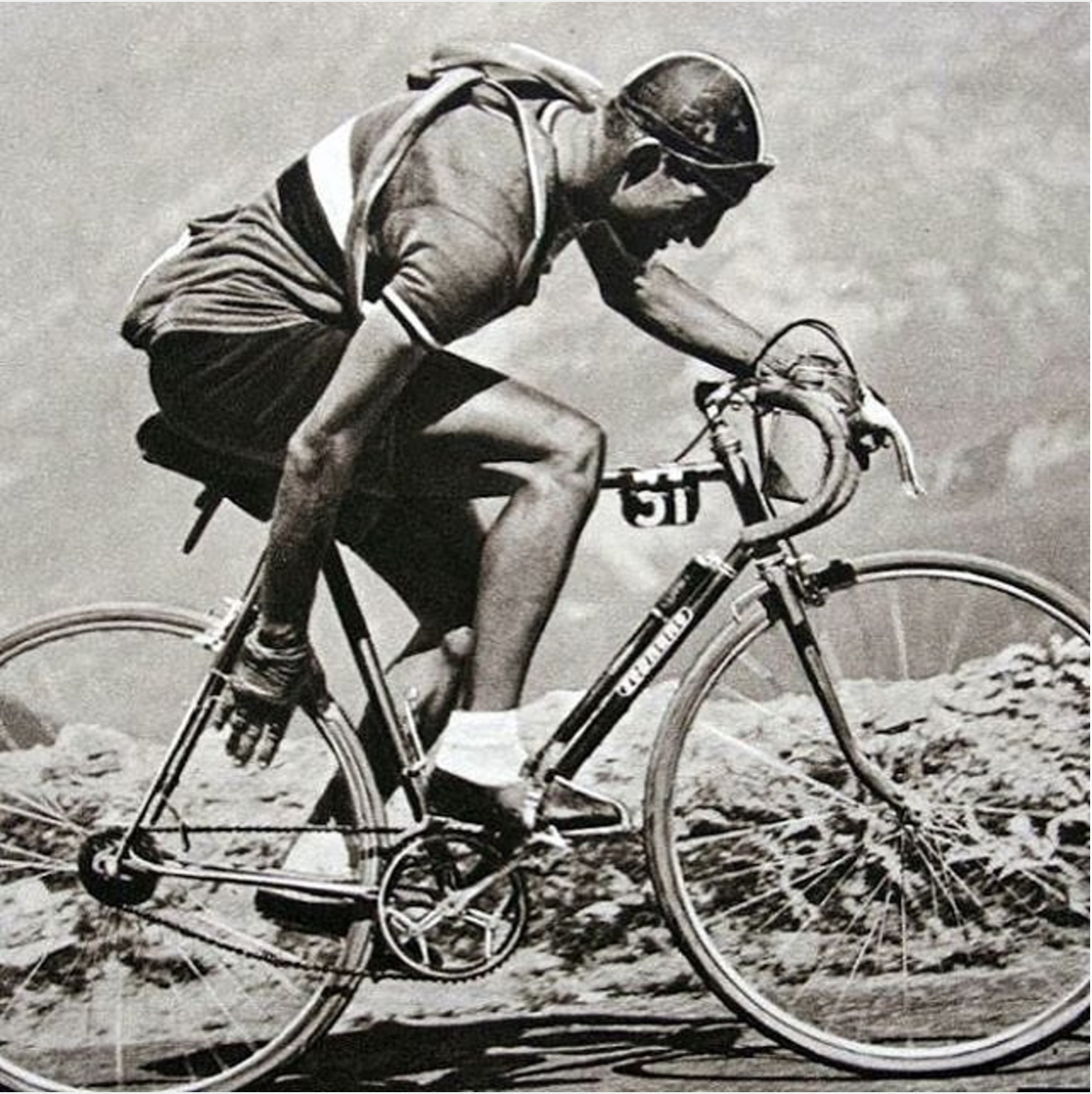The Language of the Peloton

I can’t understand the American obsession with finger food in general and sliders in particular. Finger food, in its strict interpretation, should be food for your fingers, not food which is eaten with one’s fingers. While “finger food” is inaccurate as a generality, sliders are basically just hamburgers that never got the Rule #5 Talk. Burgers are meant to be big, juicy, and stop your heart in its tracks. It’s the American Way.
But the point is, despite Juliet’s assertion to the contrary, there is quite a bit in a name. Whereas the mere mention of “sliders” invokes some level of anger within me, there may be a few people around who actually like the name quite a lot; perhaps it makes them feel like eating four tiny burgers is healthier than eating a single giant one, as though it will somehow make their blood flow faster through their presumably already-clogged arteries.
Being bilingual gives one a view into the use of words that people who speak only one language would struggle to have. Not that being bilingual makes you any better at communicating; quite the oposite, in fact. I find that words and letters are very fluid for me and I tend to work with a general “sense” of what a particular word’s definition might be while monolingual people understand quite well what specific words mean and what order letters are intended to arrive in. As it turns out, knowing a word’s precise definition can be helpful in certain situations, such as when one is attempting to use it in a sentence.
But speaking more than one language (I also speak a smattering of French and a crippling amount of German) gives one a glimpse into the beautiful depth of expression that can be found in a simple jumble of letters. And this is where having a general rather than concrete sense of a word’s definition becomes a beautiful thing; I can guess the meaning of a word or sentence and not be bothered by the accuracy of my impression while still getting the meaning of what is being said. I’m then at liberty to allow my imagination to add layers of meaning atop my sense, giving a beautiful depth to a simple word. Its one of those beautiful moments in life when being wrong can be much more enjoyable than being right.
The sport of Cycling has very rich language that surrounds it. Because of the Continental influence during its formative years, it has obtained this richness by incorporating expressions from several languages including French, Italian, and Flemish. I’ve learned from speaking and learning to varying degrees of failure some of these languages, that American English is actually a relatively inexpressive language. American English is usually focussed on giving meaning to things and actions while European languages, while doing much of the same, will modify words slightly to also convey some spirit that surrounds the intention of their use.
Its not surprising, then, that when we speak of our sport, we generally turn to the Continental terms in order to describe the more subtle properties we’re trying to convey. Ten of my favorites are below; the list is painfully brief.
- Grimpeur. French for one who goes well uphill, normally with the grace of an angel.
- Rouleur. French for one who goes well on the flat, normally with the grace of an angel.
- La Volupte. French for a fleeting moment of perfect harmony and clarity found aboard a bicycle.
- Le Fringale. French for hunger knock or bonking. Which of these would you prefer to have?
- Ã bloc. French for riding all-out, hammering, or firing off the Guns. The only English expression that rivals it’s beauty is to say one is riding on the rivet.
- Hellingen. Flemish for short, steep climbs. No English version of “hill” or climb will ever contain the word “hell”.
- Grinta. Italian for “tough”. In Dutch, the word for gravel is “grint”. Grinta conjures up visions of someone who has gravel in their gut.
- Sur la Plaque. French for moving into plate – the big ring.
- Un Jour Sans. French for “a day without”, or a day when the legs don’t seem to respond to what the mind is telling them.
- Il Posizione. Italian for the position on the bike where a rider can hammer on the pedals to go faster with less effort.


@itBurns – that Phil quote is magnificent!
@Marcus
Some more Aussie ‘Language’ used when growing up at the club;
“Come-a-Gutsa” = Fall of one’s stead
“Bring it on!” = Yelled out when making or chasing a break away
“Flounder” = rider who stays at back all race long to place in the sprint
“Ball bagger of a road/climb” = dead road surface that sucks the speed off
“Soft cock!” = rider who pulls in just before taking a turn in front
“Warwick Cappers” = anyone with white shoes – back in the 80’s. (I had Duegi’s)
“Nelson Vailed it!” = won the sprint like a champ
“Borrow the Silca” = the only track pump shared by everyone to pump 3 atmospheres in your tubs
@frank
Answer me this: why isn’t there a word en Français for a sprinter? Or is there? We have grimpeurs, rouleurs, puncheurs, but no word for sprinters. Is it because, ultimately, the sprinters lack panache, with the result that they are unmeritorious of a monicker?
@scaler911
In Belgium in the early 90’s the common language with the Lithuanians was Spanish.
Awesome article, Frank!
I went out Sunday for a group ride that didn’t really materialize. Went for a solo ride nonetheless and was Un Jour Sans the entire time. Ugh. I tried to ignore it & just enjoy the incredible weather & fine cycling roads but I could not help but wonder what had caused such dismay for the guns. Sleep? Diet? Both? Just an off day. Some days the guns fire off, some days they refuse.
I’ve taped an index card with faire le metier written on it over my desk , thanks to learning about it here & realizing it was a great mindset on or off the bike.
My father grew up among many different ethnic groups – Italians, Hungarians, Germans, Poles, Jews (I know, not quite an ethnicity) – and I’m realizing all the time that words he uses are from these other folks. Usually they are not the nicest words, but hey, it’s fun to be multi-lingual. And it’s interesting for me that he grew up in such a diverse environment.
Great article Frank, as you usually do
Its a mind opening matter to see our language in its origins of other words. Speaking a ‘splattering’ of a little spanish, a little Italian, and a mostly have a command in Latin, its very interesting to see how English got really translated and evolved over time, sometimes for good, sometimes not
And then there is our beautiful words in ‘the Rules’
Where ‘normal’ people look at us w/a cock of the head, and wonder what the crap we are talking about when we say HTFU! and ‘shut up legs’…its like speaking pig latin to a 15 y/o
Timeless and something that will inevidibly be discovered years from now in a time capsule somewhere in Buck Rogers neighborhood
@RedRanger
Sure, but how much more awesome would it be if it got the Rule #5 Talk and was more biggerish?
@scaler911
That’s absolutely right. And these days, most of those guys speak English. Imagine 1980 when the first wave of English-speakers were hitting the European races? They all learned French and Italian.
One of the incredibly cool things about Europe in general is the appreciation of other languages. Almost everyone learns to speak another language and once you’ve learned one, it becomes easier to learn more because of that phenomenon where you get your brain to break out of that pattern where letters in a certain order make a certain sound. Your brain gets more fluid about that stuff, which is both good and bad.
And it was that way; Merckx went to Molteni and learned Italian. In the old days, you started by learning multiple languages for that reason; go out into a break and you can’t communicate and you’re fucked. Pro cyclists may have been generally educated less than other populations because they turned Pro at 19 or 20 rather than going to or continuing school, but they all still learned to speak a handful of different languages.
@nginther
Yeah, and as a few others have mentioned some other good ones. That’s a great one, it paints a picture that takes quite a bit of talking to express otherwise.
@il ciclista medio
Yeah, nothing wrong with English as it is, it’s just less expressive in this way than others; but the beauty is that we have it both ways by incorporating these words into our vocabulary.
@Gildasd
Never heard that, perfect example…I’ll have to aggregate these…
@Oli
YES! Another good one…
@sthilzy
Unfortunately, Bring it On is a cheerleading term. We use a lot of those other ones in Murcan English; Delivering the Mail is a good one – we also use “the paperboy” which is the same thing.
@Wayne Schimmelbusch
Someone might need to correct me on this, but I thought it was Sprinteur?
@wiscot
To my ear, massaspurt sounds like a niche skill a male pornstar might have.
@Wayne Schimmelbusch @frank
Because the French can’t sprint?
@frank
I know, but wouldn’t it be fun to hear uncle Phil shout ‘And Cavendish is the king of the massaspurt!”
Great article Frank! First for what you wrote, and second because you’ve given us the opportunity to write and to learn the words we love in every language we like.
Some Italian words are not spelled correctly but it don’t mind they still sound great.
My personal favourite is “scatto”, and is exactly what Bartoli do at 0:55 of this video.
http://www.youtube.com/watch?v=uXcJWZyZ_Bo
“Strade” is a fantastic word. Cool enough as to be even included in the title of a soon to be classic. And when qualified with the word “bianche” afterword denotes a Sense of Place and conjures up vivid images. That said, “gravel” and “graveling” do it for me too as the English equivalent.
Bonus – this great Phil quote:
LOVE it and can hear it in my head just reading it. I also love it when he goes crazy and starts yelling, “Look at the FACE on that man” when some pro is killing himself in the race.
@Marko
But the irony of il strade is that that is what everything was as our sport was entering the golden age. Now they have to point it out and name a race after it.
Italian is about the only european stock I lack. But those folks have some fantastic terms. Scalatore is one of my favs.
English is more than 5x the size of French (in words), perhaps because of items like “Tout à droite”–perfect, direct, clear, simple.
@Pedale.Forchetta
Ahhh, Michele Bartoli. Still my favourite rider ever, he could frustrate and delight in equal measure but ALWAYS with sprezzatura.
NAME DROP COMING…Genuinely nice guy, i met him at a dinner once in Milan and he sent me a signed postcard at Chrstmas after his Italian Road Championship, must have been the English Bitter i told him he needed to drink more of! I still have it at home. That and a signed Boardman picture, post Hour Record. Actually i must dig out all that stuff, an intersting Sunday awaits.
@Zoncolan, @Pedale.Forchetta
Bartoli was one of my favorites ever as well; inspired me entirely to start experimenting with small frames and low bars; he always looked so beautiful on his bike with his bars down low, rolling effortlessly in the Phantom Aerobars. So awesome!!
And a fitting photo of a guy who is used to hacking people apart with his bare legs…
@frank
@frank +++++++1 always good to meet a fellow Bartoli fan. His ability to suddenly go 15km/h faster on a false flat without any perceptible change in rhythmn were beautiful to see.
nice post!
so many expressions in french… here: http://www.nutri-cycles.com/dossier-cyclisme-et-decouverte-les-expressions-et-jargon-du-cyclisme-4-265.html is a little list
i like ‘coup de cul’ (small climb where you need to lift your ass off the saddle) and ‘raton’ (=wheelsucker)
@frank
If you consider what you are riding now “small frames”, I want to see the observation towers you used to roll around on.
Admiring the time and energy you put into your site and detailed information you offer.
It’s good to come across a blog every once in a while that isn’t the same unwanted rehashed material.
Great read! I’ve saved your site and I’m adding
your RSS feeds to my Google account.